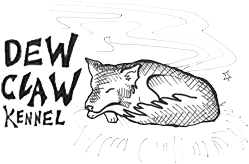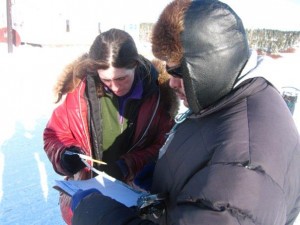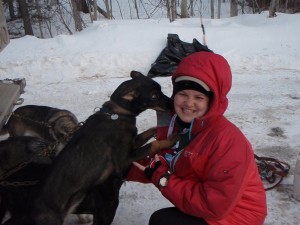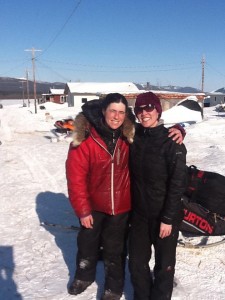Yes folks we were super happy to hear from returning Team Dew Claw members Carol and Don that they would like to sponsor the White Mountain checkpoint this year. Even more happy to honor their request that it be sponsored “in honor of all the Iditarod volunteers”! We could not agree more that the volunteers are amazing, and without them the Iditarod would not be possible. Mush Thanks to All!
Carol and Don have had the opportunity to see first hand what goes on at remote checkpoints, and are well aware of the hard work done by dedicated volunteers. But for my friends I thought it would be fun to explain a little but about the important roles they play. From the Iditarod Air Force and the veterinary team who donate their time and specialized services to provide logistical support and excellent canine care, to the people handling the phones at race central in Anchorage and signing in mushers at checkpoints on the trail. Every March the most delightfully eclectic group of characters comes together for our annual date. Presiding over the event, the reason we all come together is a passion for mushing and a love of the dogs.
And the bottom line is, Dan & I (None of the mushers) could not do what we so dearly love doing – race our dogs at these wonderfully run long distance races; without the army of volunteers that makes it all happen.
Now I have to be brutally honest, I am horrible with names. And after a few days with lots of running and little sleep I am worse. So some of the names have been lost, but the memories of the wonderful volunteers who personally made my race better just by being there and doing an excellent job are plenty. To give you some perspective this is how my race is impacted by volunteers:
Long before the race starts volunteers are hard at work raising funds, and helping do the office tasks necessary to make the Iditarod happen. Spent some time with some of then at the Tanana Valley Fair Iditarod booth this year. They even got this photo of me being goofy and hawking tickets.
Then, closer to race time, mushers will turn in our drop bags to the Iditarod Trail Committee and the volunteers go to work sorting and preparing everything to be shipped out. You can see some footage of volunteers working on the mushers food drops here.
In the week leading up to the race mushers, officials, and volunteers all convine in Anchorage, and I can only begin to imagine how much behind the scenes work is being done by volunteers there. My biggest interaction is with the Vet Crew. Dogs are brought in before the race for blood draw and EKG readings. You can see some photos and a video of the EKG at the “Teacher on the Trail” blog. Providance Hospital in Anchorage donates the lab work and EKG reading. These results are evaluated with Iditarod head Veteranarian Stu Nelson, and this information helps us make the best informed decisions we can about which of the dogs we had screened will ultimately make the final race team. As a final screening all dogs are given a full exam by race veterinarians at Iditarod headquarters before the race. Dogs will also undergo a check before both the ceremonial start in Anchorage and the race start in Willow. Here is a nice little overview of what Vets check at a vet check.
At both the Anchorage and Willow starts there is literally an army of volunteers. Arriving long before the mushers and fans, they set up the barricades and mushers staging area. As massive amounts of people arrive they do crowd control and park dog trucks. Each year we are joined at the start by 4-5 Iditarod volunteers, in addition to our own handlers, to help ensure the team can be walked calmly to the start line without incident. And even after they have released us to the adventure of the trail ahead there are still people manning road crossings until all the teams are out past roads and running the trail.
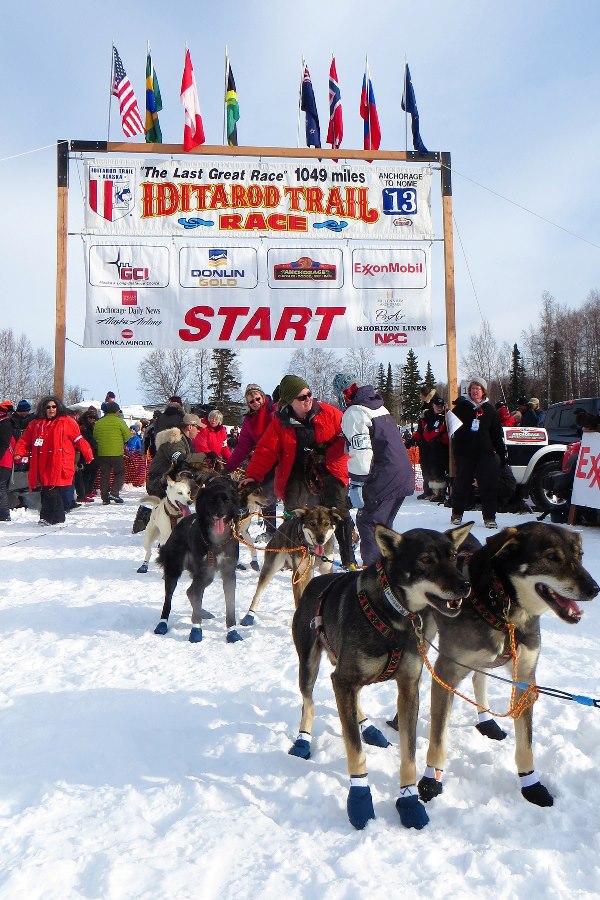
Volunteers help with crowd control and leading teams to the start line. Armbands are given to dog team handlers, ID badges/lanyards to other volunteers. Photo TC Wait.
Now we start hitting the checkpoints. But volunteers have been there for days setting things up for the mushers, organizing drop bags & straw, making spots to park teams, and a bajillion other tasks. At checkpoints in communities the task is hard work. At remote checkpoints with limited resources it becomes formidable. And at all checkpoints it is the herculean efforts of the volunteers that make it possible. And there are so many examples of how these efforts have a huge effect on the mushers. Pulling into Iditarod this year after a long wet run and being met by a smiling face and offered a nice parking place near the musher cabin out of the wind, because volunteers had come in early and shoveled out spots for teams off the river in the trees. Or being offered french press coffee in Eagle Island, a traditionally inhospitable spot where race volunteers Jim Gallea, Tyrell & Tekla Seavey go above and beyond to make up for that. There is not a spot on the trail where mushers do not rely on the volunteers.
The first person I see when I roll in is the checker. Now I have to be honest, there is a very good chance depending on how busy things are, they have had as little sleep as I have. Also a very good chance they have been living in the same clothes as long as I have. And living at a checkpoint means you are limited to available foods. (Side Note: the communities along the trail are small and rural and most do not have a large grocery store, although some may have an AC, an Alaskan convince store of sorts. Other checkpoint are remote locations and people are limited to what foods they ship in, cooking and storage facilities may vary.) Now even with all this I have yet to meet a checker who was not smiling and happy to see me. And I have pulled into checkpoints on some brutally cold nights and was still greeted with a smile.
The next volunteer I will work with is the vet. Now this is a group I am particularly grateful for; the many wonderful veterinarians who volunteer for the race. In sharing their knowledge and enthusiasm for dog care they have made me a better musher. I value their friendship and advice.
While I am caring for my team there is another very important group at work, might be my mom’s favorite volunteers, race comms and stats. For more details about what they accomplish, read here. They are the hard working, caffeine pounding, up all night to bring you the news, folks who send & receive race communications and official race standings, passing important information from the trail to the web and ultimately my mom (Who most likely was up in the middle of the night checking the GPS tracker and website wondering where her little girl was.) The job can be pretty high stress, with communication being both critical to race organizers and in very high demand by many race fans watching from all over the world. I can tell you with great certainty these volunteers know how important what they do is, and are doing they very best they can in sometimes unusual situations. Technology is amazing, but it has its limits; and the middle of wild Alaska certainly tests those limits.
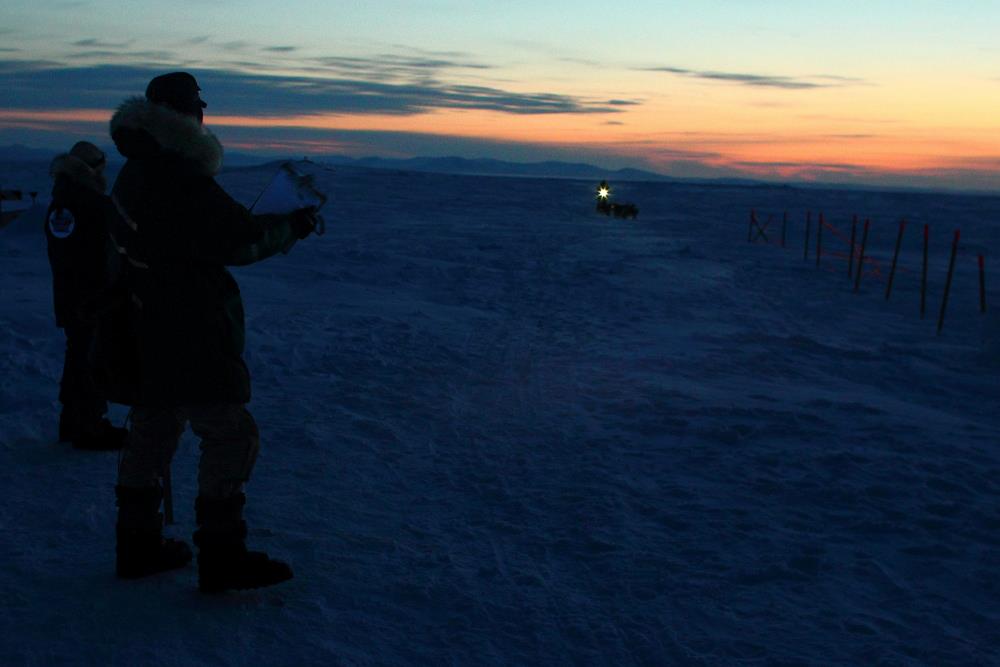
Checker is there to greet you no matter how early or late you show up. Safety 2012. Jeffery Walters comms and photo credit, Philip Walter checker.
At each checkpoint, depending on the situation there may be people to help park your team, community members bringing in food, people keeping a fire going or helping melt snow for dog water. No two checkpoints are the same, but one thing hold true; volunteers are making it happen.
And for days, over miles, this process of coming into a checkpoint, enjoying the hospitality it has to offer, and leaving for points farther down the trail continues. Until the adventure ends in Nome. The team and I can rest. But there are still plenty of people working. Volunteers in Nome monitor the dog lot, and ensure that dogs can rest safely and in peace. I found this little video of the dog lot in Nome, and you can see it is well monitored. Checkpoints stay open till the last musher is through, and then they can begin the job of cleaning and packing up. In Anchorage dogs that were dropped on the trail are being flown in and cared for until designated handlers can come pick them up. (Not sure what a dropped dog is? read this) I am sure I have missed some of the important jobs going on behind the scenes, Sorry! But there are really so many things that go into making a race like Iditarod possible, and my limited perspective, how could I?!? Doesn’t mean I am not thankful that you do what you do, because I am. I am Very Thankful for everyone who does what they do and gives me the honor of doing what I love to do.
As I said each March we all attend the worlds largest convention of Mushing Addicts, coming together each playing an important role. In much the same way people are amazed that someone would want to run the Iditarod, I am in awe that these volunteers spend their limited vacation time, to fly to Alaska, and work so hard in such interesting conditions. Over the years great friendships have been made, and I look forward to seeing these friends each year at various locations along the trail.
But the Iditarod is not the only place mushing addicts come together to make great events happen. The Yukon Quest is also fueled by an army of volunteers. All the qualifying races needed for rookies to enter the Yukon Quest and Iditarod, they too are completely volunteer organizations. The exciting events that make mushing season fun; from the Top of the World, to the Denali Doubles, the Northern Lights, to the Kobuk 440, they all exist because people care enough about the sport of mushing to make the happen. Really humbling as a musher to think about that… all these events are possible because people care enough about the sport of mushing to make it happen.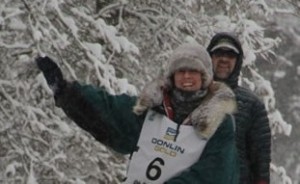 People like Carol and Don who sponsored White Mountain for the Volunteers.
People like Carol and Don who sponsored White Mountain for the Volunteers.
So from them, me, Dan, & all the dogs at Dew Caw;
to ALL the Volunteers – Mush Thanks!!!
